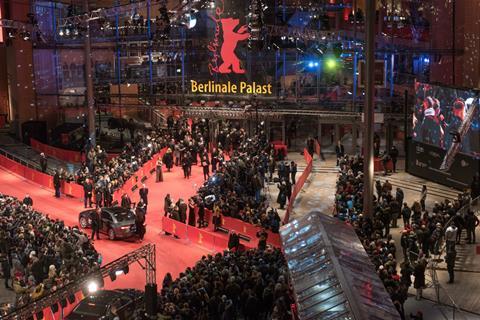
The Berlinale has disinvited representatives from Germany’s far-right Alternative fur Deutschland (AfD) party from attending the festival’s opening ceremony on Thursday, February 15.
The festival sent out an email announcing its decision on Thursday afternoon (February 8), also posting a statement to social media.
“Over the past few days, there has been an intense discussion in the cultural sector, in the press and on social media as well as within the Berlinale team about the invitations of AfD politicians, a right-wing extremist party, to the Opening of the Berlinale. Today, the directors of the Berlinale have decided to disinvite the five previously invited AfD politicians,” read the email.
Quotes attributed to Berlinale directors Mariette Rissenbeek and Carlo Chatrian read, “Especially in light of the revelations that have been made in recent weeks about explicitly anti-democratic positions and individual politicians of the AfD, it is important for us - as the Berlinale and as a team - to take an unequivocal stand in favour of an open democracy.”
The email has been re-published in full below.
The rescindment follows several days of criticism of the festival for inviting the far-right politicians. The festival’s initial response had been that the elected representatives were invited as part of federal government and Berlin Senate quotas.
An open letter had been signed by over 200 industry professionals expressing outrage at the invitations; the letter stated “We find this to be incompatible with the festival’s commitment to being a place of “empathy, awareness, and understanding,” referencing a phrase used at the Berlinale’s January 19 press conference.
On Sunday, February 4 the festival said it would write to the AfD to discuss the invitations.
The festival will open with Tim Mielants’ Irish-Belgian co-production Small Thing Like These starring Cillian Murphy.
Berlinale Opening: Disinvitation of AfD Politicians
Over the past few days, there has been an intense discussion in the cultural sector, in the press and on social media as well as within the Berlinale team about the invitations of AfD politicians, a right-wing extremist party, to the Opening of the Berlinale. Today, the directors of the Berlinale have decided to disinvite the five previously invited AfD politicians.
The current discourse has once again made it very clear how much the commitment to a free, tolerant society and standing against right-wing extremism are part of the Berlinale’s DNA. For decades, the Berlinale has been committed to democratic values and against all forms of right-wing extremism. The film programme and the Berlinale as a cultural institution stand for this. The festival has repeatedly pointed out that it observes with concern how anti-Semitism, anti-Muslim resentment, hate speech and other anti-democratic and discriminatory attitudes are on the rise in Germany.
“Especially in light of the revelations that have been made in recent weeks about explicitly anti-democratic positions and individual politicians of the AfD, it is important for us - as the Berlinale and as a team - to take an unequivocal stand in favour of an open democracy. We have therefore today written to all previously invited AfD politicians and informed them that they are not welcome at the Berlinale,” says the Berlinale’s director duo, Mariëtte Rissenbeek and Carlo Chatrian.
The AfD and many of its members and representatives hold views that are deeply contrary to the fundamental values of democracy. Demands for a homogeneous society, immigration restrictions and mass deportations, homophobic, queer-hostile and racist remarks, as well as severe historical revisionism and outright right-wing extremism – can be found at the AfD.
In times when right-wing extremists are moving into parliaments, the Berlinale wants to take a clear position by taking a clear stance with today’s disinvitation of the AfD. The discussion on how to deal with AfD politicians also affects many other organisations and festivals. This debate must be conducted across society as a whole and together with all democratic parties.















![[L-R]: Amanda Villavieja, Laia Casanovas, Yasmina Praderas](https://d1nslcd7m2225b.cloudfront.net/Pictures/274x183/6/4/1/1471641_pxl_20251224_103354743_618426_crop.jpg)









No comments yet